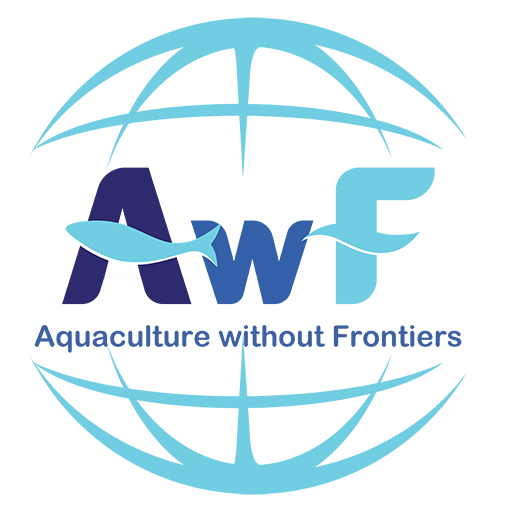After nine years AwF (UK) consolidates its activities
Category:UpdatesAfter the concept of Aquaculture without Frontiers was discussed at a World Aquaculture Society conference in Brazil in 2003, AwF was registered in the UK [AwF (UK)] and in the USA [AwF] and was launched by its founder, Michael New OBE, at the WAS conference in Hawaii in 2004.
Recently the trustees of AwF (UK) decided to close its charity in Great Britain in order to consolidate all the activities of our not-for-profit organisation within the international AwF. All the remaining funds of AwF (UK) were transferred to AwF in June 2012. Michael New remains the Founder and Patron of AwF, which is managed by a fifteen-member international board of directors.
AwF (UK) and AwF have always shared the management of the charity using a common website (currently managed by Canadian Dave Conley) and a common system of approving and monitoring field projects (the Technical Advisory Group, led by Australian Geoff Allan). AwF was chaired by Michael New for many years; he was succeeded by the Americans Kevin Fitzsimmons and Barry Costa-Pierce and by M.C. Nandeesha from India, the current AwF Chairman. Michael New remained Chairman of AwF (UK) throughout the nine years from its foundation to its closure.
The main difference between AwF and AwF (UK), which generally operated as a single entity, was that the income of AwF (UK) was raised by activities in the UK and a number of other European countries, while funds raised in the rest of the world were channelled through AwF. Each organisation supported specific AwF field projects. This article briefly recalls the activities of AwF (UK) during the period 2003-2012.
Between 2003 and 2012 AwF (UK) raised a total of £56,000 through donations (mainly from its directors and their families and friends), specific fund-raising activities, and support from aquaculture suppliers and societies. Other charities supporting third world poor also made significant contributions. Throughout its life AwF (UK) uniquely operated without any employees or management costs; its trustees were its volunteer staff and took personal responsibility for incidental costs. This enabled every penny of the funds raised by AwF (UK) to be used to support field projects. The final balance in its accounts (£10.800) was transferred to AwF and will be used for similar work.
Funds raised by AwF (UK) were used to support projects in the following countries:
- Bangladesh* (with the NGO Rangpur Rural Development Service on poverty alleviation through aquaculture)
- Kenya (with European Aquaculture Society support to fund a Wageningen Agricultural University – Nutreco student to study the potential of aquaculture development in and around Lake Naivasha)
- Kenya* (with the Holy Will Women Group on mitigating poverty among smallholders through fish farming)
- India* (with St. Xavier’s Bishramganj Vocational Training Centre on supporting small-scale aquaculture among tribal communities, the establishment of a fish hatchery and the training of youths in aquaculture and its integration with agriculture)
- India (through shrimp farm tsunami relief work administered by the Kerala University of Fisheries and Ocean Studies)
- Indonesia (by the donation of aquaculture journals and books to a library serving aquaculture development that had been destroyed by the tsunami in Aceh Province)
- Malawi* (with the WorldFish Center on sustaining famine mitigation through integrated aquaculture-agriculture)
- Nepal* (with the Asian Institute of Technology on empowering women through aquaculture and vegetable gardening in rural areas) and
- Thailand (with the Australian Centre for International Agricultural Research and the charity World Vision on training in farm-made aquafeed preparation and tilapia hatchery management).
*Major projects
Details of these projects can be found on the AwF website project pages.
The funds utilised for supporting AwF (UK) field projects came not only from many individual and corporate donors but also from a wide range of fund-raising activities. These included the following examples:
- Street Parties (England)
- Art exhibitions (France)
- Raffles (England)
- Collections at aquaculture conferences (Greece)
- Sponsored dragon-boat racing (England)
- Sponsored abseiling (Northern Ireland)
- Sponsored Father Christmas runs (England)
- Competitions at aquaculture conferences (Scotland)
- Grants from other development aid charities (England)
- Christmas bonuses from aquaculture research employees (Netherlands & Norway)
- Aquaculture student activities (Scotland)
- Barbeque (Northern Ireland)
All the enthusiastic organisers and participants of these activities were warmly appreciated. Particular thanks are due to the residents of Marlow (the home town of AwF (UK) Directors Michael New and his daughter Sophie Varley) for their unstinting support. One AwF project in India even named a fish hatchery after South Place, Marlow, where several street parties were held.
The patron and founder of AwF (Michael New, OBE) wishes his personal thanks to be conveyed to all those who have supported AwF (UK) over the past nine years and expresses his hopes that AwF will continue to help the poor in developing countries through the development of small-scale aquaculture. In particular, he wishes to thank the other three final trustees of AwF (UK), Geoff Allan (Australia), John Cooksey (USA) and Sophie Varley (UK), together with three former trustees – William Northcroft, Scott Peddie and Lorrae Hayes (all from the UK). Their support and encouragement were invaluable. He also wishes to thank the members of the AwF Foundation Group for their input during the development of the original AwF strategy in 2003-2004.
Click here for PDF with this announcement and accompanying photos from various projects mentioned.
